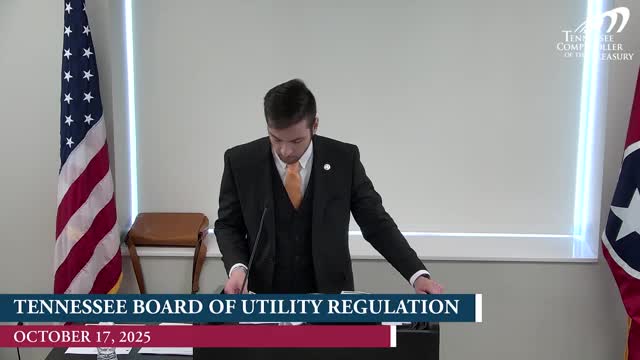Tennessee board orders Centerville to stop variable sewer charges for non‑connected properties and demands a rate study
Get AI-powered insights, summaries, and transcripts
Subscribe
Summary
The board directed the town of Centerville to cease charging variable sewer fees tied to water use for customers who have access but are not connected, ordered a rate study by mid‑February and said utilities need a minimum (non‑variable) access charge for those properties.
The Tennessee Board of Utility Regulation on Oct. 21 ordered the town of Centerville to stop the practice of imposing variable sewer charges on properties that have sewer access but are not connected to the system and directed the town to complete a rate study and return to the board in March.
The action follows a year‑long customer complaint and an attorney‑general opinion cited by board staff (OAG 98‑152) that advised utilities may assess ready‑to‑serve or minimum charges but should not bill variable sewer usage to customers who are not hooked to wastewater service. Staff told the board Centerville has been charging both a minimum bill and a variable usage charge to some properties that have access but remain unconnected.
Centerville’s attorney told the board that MTAS (the Municipal Technical Advisory Service) is completing the contract rate study; turnover at MTAS delayed the study but MTAS committed to deadlines in the coming months. The board amended staff’s recommendation to allow Centerville until Feb. 14 to complete the town’s internal data work and for MTAS to finish its external study; Centerville is to report at the board’s March meeting. In the meantime the board ordered Centerville to immediately stop the variable charging practice for known non‑connected properties and to switch those customers to a non‑variable minimum access charge. The board also instructed utilities that they are not required to reimburse customers for prior charges before the date the utility was notified and verified that the customer was not connected; however, the utility may reimburse amounts for the period between a customer’s notification and the utility’s verification.
Board members emphasized this order applies to the facts as presented in Centerville’s case and noted that other utilities might have different circumstances; however, board staff said similar practices are uncommon and asked utilities to reexamine policies. The board asked staff to survey utilities if the body wants a broader review of the practice.
